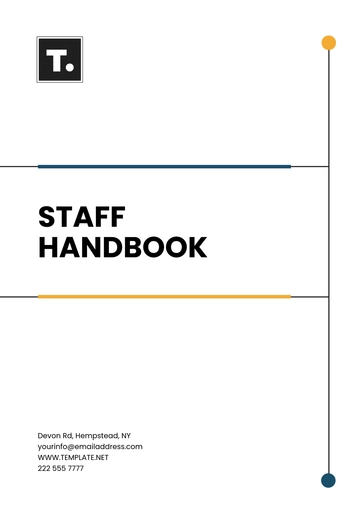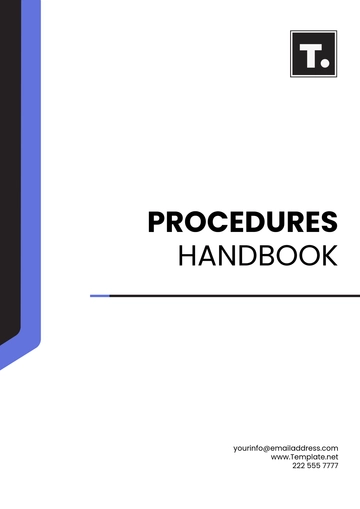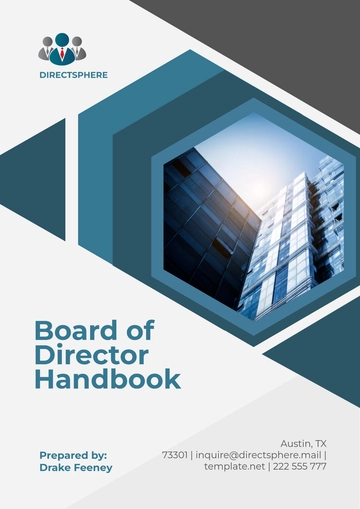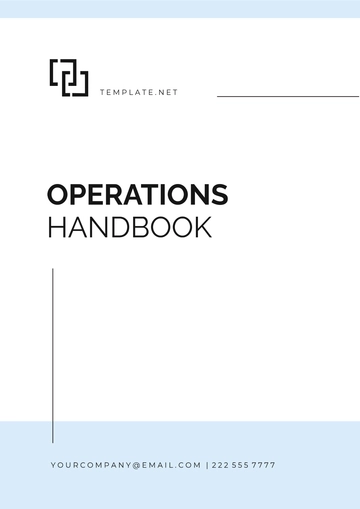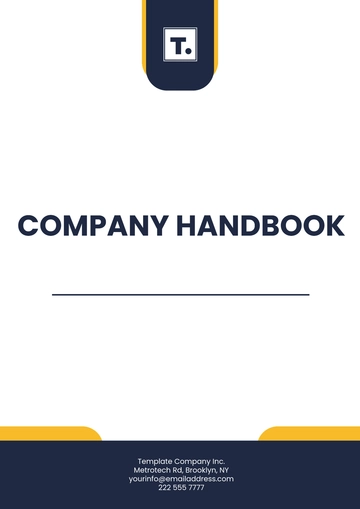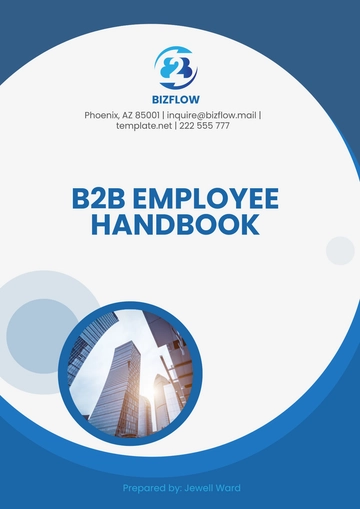Free Sales Handbook for Onboarding Mentors

I. Introduction to Mentorship in Sales Onboarding
A. Role of Mentors in the Onboarding Process
As a mentor, you are not just a colleague; you are entrusted with a mission critical to our organization's success. Your role is to be the North Star for our new hires, guiding them through the uncharted territory of their initial weeks and months with us.
You will be the sounding board for their questions, the source of wisdom they can tap into, and the embodiment of our company's values and ethos. Your guidance doesn't just shape their knowledge; it molds their confidence, helping them grow into accomplished sales professionals.
B. Objectives of the Sales Mentorship Program
Our Sales Mentorship Program has a clear and ambitious set of objectives, all designed to drive our organization's excellence:
Accelerate Integration: Our program aims to expedite the integration of new hires into our sales team, ensuring they become valuable contributors swiftly.
Enhance Understanding: In the intricate world of sales, product knowledge is paramount. Our mentors will be crucial in enhancing new hires' understanding of our products, services, and sales strategies. This not only empowers them but also ensures they can effectively communicate our value proposition to clients.
Foster Belonging: A sense of belonging is the glue that binds our organization together. Our mentorship program fosters this connection, ensuring that new team members feel engaged and part of our vibrant community from day one.
Drive Professional Growth: Ultimately, our mentors serve as catalysts for the professional growth and success of new team members. This, in turn, contributes to our organization's growth and success, creating a virtuous cycle of achievement.
As we venture deeper into the Sales Mentorship Program, we will explore its mechanics, best practices, and the profound impact it has on our organization. Mentorship is more than a program; it's a strategic imperative that paves the way for our collective success at [Your Company Name].
II. Mentorship Responsibilities and Best Practices
In the realm of mentorship, clarity and intentionality are paramount. This section serves as your guide to understanding the roles and responsibilities of mentors within our Sales Onboarding Program, along with the best practices that underpin effective mentoring relationships.
A. Mentor Roles and Responsibilities
As a mentor, your role is multifaceted, encompassing a range of responsibilities crucial to the success of our new hires.
Guiding New Hires: You are the compass that new hires rely on in the early stages of their journey with us. It falls upon you to serve as their point of contact and support, helping them navigate the intricacies of their roles, responsibilities, and challenges.
Providing Feedback and Support: Constructive feedback is the cornerstone of growth. You will offer guidance, address questions, and provide much-needed emotional support during the onboarding journey. Your insights and encouragement will be instrumental in shaping the confidence and competence of our new team members.
Facilitating Learning and Skill Development: Mastery of our sales processes, customer engagement strategies, and product knowledge is essential. As a mentor, you will assist new hires in comprehending these vital aspects of our business, ensuring they have the knowledge and skills required for success.
B. Building Effective Mentoring Relationships
The success of mentorship hinges on the quality of the relationship between mentors and mentees. To foster fruitful partnerships, several best practices should be observed.
Communication and Active Listening: Effective mentorship begins with clear and open communication. Establish channels through which new hires can reach out to you with questions or concerns. Additionally, active listening is key. Take the time to genuinely hear and understand the concerns of your mentees. Address their needs promptly and constructively.
Setting Expectations: From the very start of your mentorship relationship, it's crucial to set clear expectations. Define roles, boundaries, and responsibilities explicitly. This clarity eliminates potential misunderstandings and ensures that both parties are on the same page regarding what can be expected from the mentorship.
Building Trust and Rapport: Trust is the foundation upon which mentorship is built. Establish trust through honesty, reliability, and consistency in your interactions with mentees. By being dependable and forthright, you create an environment in which new hires feel safe to seek guidance and share their challenges.
Our Sales Onboarding Program thrives on the strength of mentorship. The roles and responsibilities you undertake as mentors, coupled with the best practices outlined here, are instrumental in shaping the success of our new team members. Together, we forge a path toward excellence and growth within [Your Company Name].
III. Onboarding Process and Training Support
Finding your way through the complex onboarding process is crucial, and this section is your guide. Here, we will delve into the intricacies of the Sales Onboarding Process and the pivotal role that mentors play in supporting new hires.
A. Overview of the Sales Onboarding Process
The Sales Onboarding Process is a well-orchestrated journey, consisting of several stages and key milestones. By understanding the framework, you will be better equipped to guide new hires through their onboarding experience.
Stages and Key Milestones: Familiarize yourself with the different stages that new hires will go through during their onboarding journey. From the initial orientation to role-specific training, each stage has its unique significance in shaping the competence of our sales professionals.
Training Materials and Resources: Access and comprehend the training materials, resources, and tools available to new hires. These resources are the building blocks of their learning journey, equipping them with the knowledge and skills they need to thrive in their roles.
B. Mentor's Role in Onboarding
As a mentor, your role extends beyond casual guidance; you are a linchpin in the onboarding process, shaping the experience and success of new hires.
Orientation and Introduction: Your journey with new hires begins with a warm welcome. Introduce them to the team, provide an overview of our company culture and values, and help them feel like valued members of our organization from day one.
Training Delivery and Reinforcement: The mentorship journey is intertwined with training. Assist in delivering training sessions, reinforcing key concepts, and helping mentees bridge the gap between theory and practice. Your real-world insights are invaluable in making the learning experience more impactful.
Ongoing Support and Check-Ins: Mentorship is not a one-time event but an ongoing relationship. Maintain regular check-ins with your mentees to gauge their progress, address concerns, and provide guidance as they acclimate to their roles. Your support ensures they never walk alone in their journey towards sales excellence.
By immersing yourself in the onboarding process and embracing your role as a mentor, you become a linchpin in the development and success of our new sales team members. Together, we shape competent, confident, and capable professionals within [Your Company Name].
IV. Coaching and Development Techniques
In the ever-evolving world of sales, coaching, and development are the compass guiding us toward success. This section serves as your manual for understanding the art of coaching and the tools of development, underlining their critical role in shaping the future of our sales professionals.
A. Providing Constructive Feedback
Feedback is the lifeblood of growth. To be an effective mentor, you must master the art of providing constructive feedback. This encompasses two key aspects:
Feedback Models: Within our mentorship framework, we rely on proven models such as the "SBI" (Situation-Behavior-Impact) model. This model ensures that feedback is structured, actionable, and well-received. It encourages mentors to pinpoint specific situations, describe observable behaviors, and highlight the impact of those behaviors. By adhering to this model, your feedback becomes a powerful tool for improvement.
Effective Feedback Delivery: Beyond models, the effectiveness of feedback hinges on how it is delivered. Your feedback should be specific, timely, and centered on behavior and outcomes. It should provide a clear path for improvement without demoralizing new hires. Effective feedback delivery fosters a culture of continuous learning and growth.
B. Skill Development
Identifying skill gaps and nurturing growth are at the core of effective mentorship. To excel in this aspect, consider the following:
Identifying Skill Gaps: As a mentor, you play a pivotal role in recognizing areas where new hires may need additional support or training to enhance their skills. This requires keen observation and open communication. By identifying skill gaps early, you can proactively address them, ensuring that new hires reach their full potential.
Tailoring Development Plans: Each new hire is unique, with individual strengths and weaknesses. Work closely with your mentees to create personalized development plans. These plans should not only address skill gaps but also align with their career goals. By tailoring development plans, you empower new hires to chart their path to success within our organization.
C. Career Growth and Advancement
Mentorship isn't just about the here and now; it's about nurturing the future. Within our Sales Mentorship Program, career growth and advancement are key pillars:
Mentoring for Professional Development: Encourage your mentees to set clear career goals. Discuss potential career paths within our organization and support their growth journey. Your mentorship should be a catalyst for their professional development, helping them progress toward their aspirations.
Nurturing Future Leaders: Within the fabric of our sales team, there are potential future leaders waiting to be discovered. As a mentor, part of your responsibility is to identify these emerging talents. Provide guidance on leadership skills and opportunities within our organization. By nurturing future leaders, you contribute to the long-term success of our team and company.
By mastering these coaching and development techniques, you become not just a mentor but a guiding force in the growth and success of our sales professionals. The impact of your mentorship extends far beyond the individual—it ripples through our organization, shaping a culture of excellence within [Your Company Name].
V. Evaluation and Continuous Improvement
In the journey of mentorship, evaluation, and continuous improvement are the compass that ensures we stay on course. This section is your guide to assessing the effectiveness of your mentorship, providing feedback to enhance the mentorship program, and recognizing the invaluable contributions of mentors.
A. Assessing Mentoring Effectiveness
The effectiveness of mentorship isn't measured by the mentor alone; it's a collaborative effort between mentors and mentees. Here's how you can gauge the impact of your mentorship:
Feedback from Mentees: Your mentees are the ultimate judges of your mentorship effectiveness. Solicit their feedback regularly. Understand their perspectives, their challenges, and their growth. Their insights will provide invaluable guidance on how to refine your mentorship approach.
Self-Assessment for Mentors: Mentorship is a journey of continuous learning. Regularly reflect on your mentoring approach. Consider what's working well and where there might be room for improvement. Seek opportunities to refine your skills and adapt to the evolving needs of your mentees.
B. Mentorship Program Feedback
Our mentorship program is a dynamic entity, and it thrives on the insights and experiences of mentors like you. Your input is instrumental in ensuring its effectiveness and evolution:
Program Evaluation and Feedback Loops: Actively participate in program evaluations and feedback loops. Share your experiences, challenges, and suggestions for improvement. Your on-the-ground perspective is invaluable in shaping the future of our mentorship program.
Adapting to Changing Needs: As our organization evolves, so too will the requirements of mentorship. Be open to adjustments and improvements in the mentorship program. Adapt to the changing needs of our new hires and the organization, ensuring that the program remains a catalyst for success.
C. Recognizing and Rewarding Mentors
The contributions of mentors are often unsung but immeasurable. It's essential to recognize and appreciate the dedication of mentors:
Acknowledging Mentor Contributions: Celebrate the contributions of mentors through recognition programs and appreciation events. This not only acknowledges their hard work but also inspires others to take up the mantle of mentorship.
Opportunities for Mentor Growth: Mentorship is a two-way street. While guiding others, mentors also have opportunities for personal and professional growth. Explore opportunities for your own development, such as mentorship training or leadership roles within the mentorship program. By continuing to develop your skills, you enrich the mentorship experience for both mentors and mentees.
In the world of mentorship, evaluation, improvement, and recognition form a virtuous cycle. They ensure that our mentorship remains a robust force in shaping the success of our sales team. Your dedication as a mentor is a testament to your commitment to the growth of [Your Company Name], and your role in this journey is invaluable.
- 100% Customizable, free editor
- Access 1 Million+ Templates, photo’s & graphics
- Download or share as a template
- Click and replace photos, graphics, text, backgrounds
- Resize, crop, AI write & more
- Access advanced editor
Guide your onboarding mentors effectively without the hassle with the Sales Handbook for Onboarding Mentors Template only here on Template.net! This editable and customizable tool, which can be easily tailored using our advanced AI Editor Tool, provides a comprehensive handbook for onboarding mentors, ensuring effective sales practices! Utilize it immediately!



